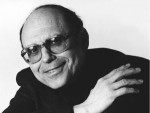Title
The William Schuman Scholar’s Chair is a prestigious designation granted by the Literature and Materials of Music Department to one Juilliard faculty member in recognition of outstanding contributions to the School’s artistic and intellectual life. Part of the Schuman Scholar’s prize, as well as part of the chair holder’s responsibility, is to present a pair of lecture-recitals at Juilliard that highlight and detail his or her career and perspective. This year, the L&M Department has announced that the Schuman Scholar will be Samuel Adler, a respected and beloved member of the composition faculty since 1997, whose tireless efforts as a composer and teacher have shaped and inspired generations of younger musicians.
Body
In his lectures—the first will take place on February 9 in Paul Hall at 1 p.m., and the second is scheduled for April 21—Adler plans to discuss what he learned from his teachers, who included Paul Hindemith and Aaron Copland, in hopes that the details of his path as a young musician will encourage current students in all disciplines to make the most of their time in school.
“As an undergrad, I was in many ways an enfant terrible,” Adler said in a recent interview, “and I rebelled against everything because I had such [an extensive] background. No matter how much we know, we have to recognize that somebody else has something to teach us. I could have learned much more if I hadn’t been so arrogant.”
“The most important thing I’m going to talk about,” he continued, “is what happened when people told me, ‘You’re not such a hot shot.’ That really turned me around and I was forever grateful. I’m going to use a couple examples of what exactly … gave me the ammo to become a composer and a teacher.”
Pedagogy has long been an integral part of Adler’s career—his landmark textbook, The Study of Orchestration, is currently in its third English edition and has been translated into seven languages. Fittingly, his desire to use his time as Schuman Scholar to promote education stems from a conversation with William Schuman himself. “We had lunch at his house and he talked about the L&M system. He [worried] that so few people know the literature,” Adler recounted, adding that there is a particular lack of familiarity with contemporary repertoire. “The idea of something new is still frightening. That’s so different from Beethoven’s time, when you went to a concert in order to hear the newest pieces.” He said that today we are “treating literature too much like a museum and I feel we need to get people excited about trying to find a different kind of program.”
To that end, Adler has thrown down a gauntlet: “The faculty should decide that no recital for credit should be done without a work written in the last 20 years. It would be a start, and it would create excitement.”
Adler is particularly concerned with the large repertoire of American symphonic music that is, in his opinion, unjustly neglected and underplayed. “The Chicago Symphony did the Second Symphony of Walter Piston for the first time two years ago,” he remarked. “The piece was written in 1931. People loved it and said, ‘Where has this been?!’” Though pleased with the response, it was a question Adler—who at 81 has spent decades alternating roles as student, friend, and colleague of the great figures of American music—had to answer with some incredulity. Then, another gauntlet was cast down. “Does the Berlin Philharmonic come here and do Gershwin and Ives?” he asked, rhetorically. “No. They come and do Brahms and Schoenberg. If an American conductor goes abroad, he should bring an American symphony. If you’re going to say, ‘We don’t have any music worthwhile, we have to take Bruckner,’ that’s taking coals to Newcastle.”
This commitment to new American music was something Adler consistently demonstrated throughout his own career as a conductor. The day after receiving his graduate degree from Harvard, he also received a draft notice. At the time, he had no idea that he would found the Seventh Army Symphony, an ensemble of enlisted American soldiers collaborating with European musicians. In spite of incredible odds—a suspicious civilian population, contentious religious groups still fighting ancient ideological battles, selfish local bandleaders who led their best players into the woods on bivouac to prevent them from auditioning for other ensembles, and an army that didn’t always understand what to do with a professional orchestra in its midst—the symphony went on to become one of the pivotal elements in cultural diplomacy in the years following World War II.
For his role in the creation of this force of good will, General Dwight D. Eisenhower recommended Adler for the Army Medal of Honor. More than his medal, though, Adler seemed ecstatic about his artistic achievements with the ensemble. “We did a major American symphony on every program, and it was sensational!”
The honors and escapades of Samuel Adler are far too numerous to detail here. Those of us lucky enough to know him know that his prowess as a composer is rivaled only by his skill as a storyteller. We can only look forward to all that we will hear in his pair of lectures as Schuman Scholar and wish him, for his sake and ours, many more years of making beautiful stories and music.





